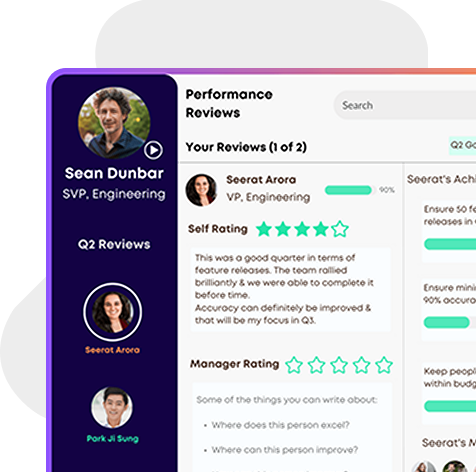

High Performance Coaching: A Team-Based Playbook

Overview
High-performance coaching is a structured, dialogue-driven approach that helps individuals and teams unlock their full potential. It prioritizes collaboration over command, open-ended questions over instructions, and continuous feedback over annual reviews.
The focus is on growth, goal alignment, and behavior shifts that foster a culture where everyone actively contributes to collective success.
High-performance coaching helps teams move from good to great by focusing on clarity, reflection, feedback, and accountability. It replaces command-and-control with a collaborative approach that builds ownership, alignment, and growth. This blog breaks down its five core elements.
What Is High Performance Coaching?
High-performance coaching is a structured form of coaching relying on a dialogue-based approach. It inspires both individuals and teams to maximise their potential and performance. It is not like routine directive management. Such modern coaching involves asking powerful questions and providing genuine, constructive feedback. It focuses more on aligning goals and supporting behavioral shifts.
Key characteristics of high-performance coaching include:
- Collaboration and not direct command
- Asking open-ended questions rather than giving instructions
- Seeking ongoing feedback rather than having annual reviews
- Focusing more on improvements and not just assessments
- The aim is to foster a culture where every team member owns their growth and contributes to collective goals.
What High Performance Coaching Looks Like Inside Organizations
High-performing organizations have coaching woven into their everyday work fabric. They do not rely on sporadic feedback systems or isolated annual reviews. Primarily, managers and teams engage in ongoing and structured coaching conversations.
An efficiently high-performing coaching culture is visible through:
- Regular coaching sessions - either one-on-one or team-based
- Transparent processes of goal-setting, leveraging your organizational mission
- Feedback loops that focus on actionable and growth-oriented objectives
- Psychological safety to learn from your own mistakes
- A system that supports coaching, a top-down and peer-to-peer approach
Benefits of High Performance Coaching (For Individuals and Teams)
High-performance coaching is beneficial in unlocking the full potential of both individuals and teams. It fosters a culture of growth, self and peer motivation, and continuous improvement. This approach works both to accelerate personal development and engage individuals and teams. It also enhances a sense of collaboration, innovation, and collective success amongst your teammates. Here’s how your benefit on the individual, manager, and team levels:
A. For Individuals
Individuals benefit from the process of high-performance coaching with:
- Accelerated Growth: Personalized feedback and structured reflection help individuals build new skills and stretch capabilities.
- Increased Engagement: Employees who feel heard and supported are more motivated and invested in their work.
- Ownership of Development: Employees set and pursue their own growth goals, boosting autonomy and self-leadership.
- Greater Satisfaction: Regular coaching leads to a sense of accomplishment and purpose.
B. For Managers
Managers can derive the following benefits from high-performance team training:
- Better Team Performance: Coaching unlocks discretionary effort and aligns individual actions with team goals.
- Stronger Relationships: Managers build trust and rapport through meaningful conversations, not just directives.
- Less Micromanagement: Coaching fosters independent thinkers, reducing day-to-day oversight needs.
- Leadership Development: Coaching skills prepare managers for higher leadership responsibilities.
C. For Teams
Teams can significantly benefit from high-performance coaching:
- Improved Collaboration: Coaching encourages open communication, shared accountability, and collaborative problem-solving.
- Enhanced Innovation: A culture of reflection and feedback sparks creative solutions and risk-taking.
- More Precise Alignment: Teams are unified around well-defined, shared objectives.
- Sustained High Performance: Teams develop systems to maintain and replicate success.
Core Components of High Performance Coaching
Do you often wonder how to become a high-performance coach?
High-performance coaching leverages intentional practices to empower both individuals and teams to achieve excellence. At the heart of this practice lie its key components, discussed below. These key components collectively transform an ordinary collaboration into a phenomenal process for delivering extraordinary results.
With a consistent approach, your organization can leverage these elements to form a sustainable coaching base for a high-achieving team.
1. Clarity of Goals
A high-performance coach should avoid unclear or conflicting goals. Such goals may lead your team to frustration and slow down its progress. High-performance coaching starts with co-setting clear and measurable goals. They focus on mutually understood objectives. This gives the work a purpose and the right intention to align the team's energy in the right direction.
Pro Tip: Focus on using the SMART goals approach, i.e., Specific, Measurable, Achievable, Relevant, and Time-bound goals, to drive a focused attitude with a sense of accountability.
2. Structured Feedback
Feedback is good if the process is continuous and specific to your pre-defined goals and objectives. High-performance coaching normalizes a two-way feedback system. It praises when praise is due. At the same time, it helps you address the blind spots in your growth areas with candor and courage.
Pro Tip: As part of your high-performing team training, you should focus on delivering feedback using an SBI model. This model stands for Situation — Behavior — Impact and focuses on clarity and impact.
3. Coaching Questions > Instructions
You are not just a people manager now but a high-performance coach with greater responsibilities. Rather than issuing orders, you should have open-ended conversations with your team. Such questions hint at self-discovery to encourage ownership and foster a problem-solving attitude.
Sample questions:
- 1. “What outcome are you hoping for?”
- 2. “What’s getting in your way?”
- 3. “What’s one small step you could take?”
- 4. “How will you measure progress?”
4. Behavioral Reflection
Being self-aware is the foundation for growth and success. As a high-performance team training coach, your focus should be on facilitating a reflection on your team’s successes, failures, and patterns. This approach makes learning a continuous process, enabling individuals and teams to pivot quickly as and when needed.
Pro Tip: Regular retrospectives or learning reviews help your teams fine-tune their performances.
5. Accountability + Autonomy
True high-performing coaching thrives on achieving a good balance between accountability and autonomy. Managers coach teams to be proactive about owning the responsibility for results. This allows freedom over how to achieve them. This sense of independence increases their skills in ownership to fuel an innovative culture.
Pro Tip: Be proactive in celebrating wins, whether big or small. Also, hold honest conversations about your team’s setbacks and focus on what can be improved.
{{cta-1}}
How to Become a High-Performance Coach (As a Manager)
Here is a step-by-step approach to becoming a high-performance coach:
Commitment Towards a Growth Coaching Mindset: Shift your mindset from “direct and correct” to “ask and guide.” As a high-performance coach, you should view every interaction as a growth opportunity.
Learning Core High Performance Coaching Skills: The first and foremost thing a high-performance coaching manager should imbibe is mastering active listening. At the same time, you should also develop skills such as powerful questioning and constructive feedback delivery.
Building Team’s Trust and Safety: Work towards creating an environment where team members are comfortable sharing and voicing their ideas and concerns.
Scheduling Your Regular Coaching Conversations: Do not wait for your annual reviews. Actively incorporate coaching ethics into your weekly and monthly routines to see the difference.
Encouraging Ownership: Invite your team to set goals that align with your organisational goals and objectives. Identify any challenges and propose practical solutions. You should act like a thinking partner and not just a problem-solver.
Reflecting and Adapting Right: After having healthy coaching conversations, invite feedback from your teammates on your coaching style. This feedback is essential for you to adjust your coaching as needed.
High Performance Coaching vs. High Performance Training
Both high-performance coaching and high-performance team training aim to elevate individual, team, and organisational performance. Yet, they are pretty different from each other, and here’s how:
{{cta-2}}
Building a High-Performance Team Through Coaching Culture
Establishing high-performance training demands both intention and persistence. Only if your organization has an intention behind it will it be persistent with this approach. Here’s how you can imbibe this type of coaching into the DNA of your team:
Setting the Right Tone at the Top: It starts with aligning with your senior leaders. They should function as benchmarks for modeling coaching behaviors—listening, questioning, and empowering.
Make Coaching Skills Universal: Train all your organizational managers and team leads with effective coaching techniques. Please provide them with the essential resources and mentorship.
Integrate Coaching Approach Into Your Organizational Workflows: You can do so by tying coaching with OKRs and reviewing projects. Daily stand-ups make your project “the way we work,” and not as a separate initiative
Recognizing and Rewarding Your Coaching Moments: Appraise your high-performance coaches by highlighting examples of their coaching approach's tangible impact. Celebrate those victories with your actively coached peers.
Measuring and Iterating: You can do so by engaging in performance surveys and leveraging feedback tools. Performance metrics are great at assessing your organizational culture shift. Continue adapting your coaching approach to fit your organizational requirements.
Building a transformative coaching culture isn’t an overnight process. It requires commitment, patience, and a focus on nurturing agile, resilient teams that consistently deliver high performance.
Build a Culture Where Managers Coach, Not Just Manage
Great managers don’t just direct. They coach. Klaar helps you lead high-performance conversations with structured goals, feedback, and reflection.

Make Coaching a Core Part of How Your Team Performs
Coaching isn’t an HR initiative—it’s a performance system. Klaar turns feedback, goals, and growth into weekly momentum.

Wrapping Up
High-performance coaching turns teams from meeting expectations to exceeding them. It empowers managers to coach, not control, and helps employees take ownership of their growth. With goal clarity, feedback, and reflection, it builds the foundation for sustained team success.
.svg)
.svg)




.svg)

.svg)